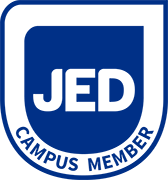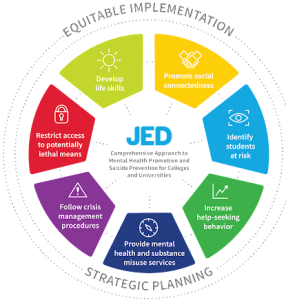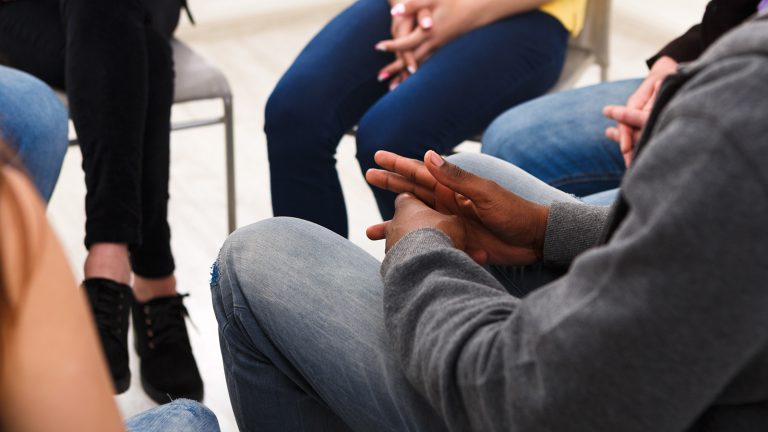JED Campus
As one of the six Minnesota colleges and universities that participate in the JED Campus program, St. Scholastica is committed to efforts to enhance and improve supports around mental health, wellness, substance misuse and suicide prevention. These efforts equip our students with the skills to thrive.
 JED Campus is a nationwide initiative of The Jed Foundation designed to empower schools with a framework and customized support. By becoming a JED Campus Member St. Scholastica has committed to the emotional well-being of its students, faculty and staff.
JED Campus is a nationwide initiative of The Jed Foundation designed to empower schools with a framework and customized support. By becoming a JED Campus Member St. Scholastica has committed to the emotional well-being of its students, faculty and staff.
Comprehensive Approach and 7 Domains
In collaboration with JED Campus, St. Scholastica has implemented a comprehensive approach to mental health and substance use prevention for the campus using the JED Campus model. JED’s programs are grounded in an evidence-based model which identifies 7 key domains for strategic planning and equitable implementation.
 These domains include:
These domains include:
- Promote social connectedness
- Identify students at risk
- Increase help-seeking behavior
- Provide mental health and substance misuse services
- Follow crisis management procedures
- Restrict access to potentially lethal means
- Develop life skills
The 7 key domains are used to assess efforts currently being made on campus, as well as identifying the college’s existing strengths and areas for improvement.
Contact Us
Kelly Mullan, MA
JED Campus CO-Chair and
Associate Director of General Education
kmullan@css.edu

St. Scholastica’s Four-Year Strategic Process
Because of the increasing need for mental health services, St. Scholastica has committed to the process of reviewing and enhancing the services and supports for all of our campuses and locations.
This is a four-year initiative that was approved and supported by the St. Scholastica Board of Trustees in 2020. Additional funding and support for projects within this initiative have been provided by the Timothy Miller Fund and the Tom and Mimi Stender Family.
JED Campus Journey and Timeline
Academic year 2020-2021
- Recruitment of St. Scholastica JED Team committee members
- St. Scholastica hosts JED Campus Team kick-off
- Campus Baseline Report completed and feedback received
- Virtual site visit with JED Advisor and Campus Expert
- Development of 6 Working Groups to target campus change
Academic year 2021-2022
- St. Scholastica Working Groups establish priority goals and objectives
- Working Groups begin to enhance and implement strategic goals
- Healthy Minds Student Survey administered October 2021
Academic Year 2022-2023
- Working groups continue to implement and improve goals campus wide
- Review of Healthy Minds Student Data
Academic Year 2023-2024
- Re-evaluation of Strategic Plan
- Exit Interview
- Healthy Minds Student Post Survey
Strategic Plan Working Groups
St. Scholastica has identified the following strategic goals and action steps. Six key working groups were created to address each objective:
Communication and Coordination of Efforts Working Group
This group’s objective has been to develop and implement effective campus-wide communication strategies to ensure the St. Scholastica community knows about and understands what mental health services and resources are available to them.
The working group has worked to:
- Develop the St. Scholastica Bandana Project as a campus safety net
- Increase the visibility of crisis resources on the website and in high-risk areas of campus
- Expand mental health and wellness resources to reflect our diverse student needs
- Develop the Faculty Guide for Mental Health Resource which is updated each semester
Clinical and Substance Abuse Services Working Group
This group’s objective is to ensure that high-quality mental health and substance use services are available to St. Scholastica students, as well as making sure that those services are strengthened by utilizing best practices in prevention and intervention.
The working group has worked to:
- Implement a prescription medication disposal program
- Increase visibility of substance use resources and supports
- Implement the annual Health and Wellness Fair
Equity in Mental Health Working Group
This group’s objective is to develop, implement, and refine on-campus programs to support the emotional well-being and mental health of students of color, LGBTQ2S+ students and students from other marginalized populations. This subcommittee is a joint collaboration with St. Scholastica JED Campus and the Office of Inclusive Excellence.
The working group has worked to:
- Comprehensive review of supports, services and ongoing needs for students identifying as LGBTQ2S+
Life Skills Working Group
This group’s objective is to develop and apply campus-wide initiatives that promote life skills education for students, aimed at teaching them healthy ways to cope with the stress of college life.
The working group has worked to:
- Develop life skills curriculum content
- Create an inventory of life skills curriculums offered across campus
Recognize and Refer Working Group
This group’s objective was to implement a comprehensive recognize and refer program to assist faculty and staff in identifying students who may be struggling academically, socially or emotionally. They ensure that faculty and staff have knowledge, resources and skill to support and refer to appropriate campus resources.
This working group has worked to:
- Develop a mental health syllabus statement
- Increase the number of campus community members completing suicide prevention training
Student Support and Campus Protection Working Group
This group’s objective is to optimize the policies and practices of interdisciplinary campus teams that are responsible for providing both support and care to St. Scholastica students.
This working group has worked to:
- Strengthen the interdisciplinary systems which support student success
- Enhance a Behavioral Intervention Team
- Increase training for faculty and staff around campus supports and resources to support students
- Support students experiencing academic, social, emotional or behavioral concerns
So far, St. Scholastica has trained over 700 community members in Question, Persuade and Refer (QPR) Suicide Prevention Training and over 122 community members in Mental Health First Aid. We are hoping to continue to train many more to better support our students on campus!
Campus-Wide Interventions
St. Scholastica’s Counseling Services, in collaboration with Jed Campus community members, has developed a mental health safety net for our campuses which include several evidence-based models of interventions. A key strategy for supporting students on college campuses is the early identification of students experiencing mental health distress, as well as the ability to support and refer those students to appropriate resources.
There are three programs that we are using to train and equip our community members to be able to assist when confronted by students with mental health concerns. These include Mental Health First Aid, QPR Suicide Prevention Training and the Bandana Project.
Question, Persuade and Refer (QPR) Suicide Prevention Training
This 1.5-hour program teaches attendees how to identify when individuals may be struggling with mental health distress, recognize warning signs for suicide, and increase knowledge of resources and referrals for people at risk for suicide.
Mental Health First Aid
This 8-hour program teaches how to identify, understand and respond to signs of mental illnesses. Training provides the skills to reach out and provide initial help, resources and support to anyone who may be developing a mental health concern, substance use problem or experiencing a crisis.
Bandana Project
 The St. Scholastica Bandana Project: Saints Stompin’ out Stigma was developed in 2022 to decrease stigma around mental health concerns and increase awareness of mental health resources and available support for students, faculty and staff. This program offers additional training to those who have already completed the QPR and Mental Health First Aid programs.
The St. Scholastica Bandana Project: Saints Stompin’ out Stigma was developed in 2022 to decrease stigma around mental health concerns and increase awareness of mental health resources and available support for students, faculty and staff. This program offers additional training to those who have already completed the QPR and Mental Health First Aid programs.
Those who have completed the program and pledge to be a resource to those struggling with mental health concerns display a yellow bandana as a signal that they are willing and able to provide support. The signature yellow bandana is not only a way to identify people to help, but it also serves as a visual reminder that in general, mental health supports are available to support someone struggling with life events, circumstances or challenges which impact mental wellness.
Saints Bandana Pledge
If you are struggling, know that I value you and want to support you.
I will listen if you need to be heard.
I will acknowledge your lived experiences and the impact of your past experiences to the best of my ability.
I will acknowledge and honor generational and historical trauma to the best of my ability.
If you need more than to be heard, I will help you find support and resources.
I will see you as an expert of your needs and will trust you to communicate what you need.
I will recognize that I too may have days when I need to be heard and will communicate my needs to someone.
I will find support and utilize resources when I need more than to be heard.
Please know that, if I am not able to support you, I will find someone who can.
I value you as a human being and as a part of our Saints Community. You are not alone.
With this pledge, I am declaring support for those, including myself, who may be dealing with challenges to their mental wellness and emotional well-being.

JED Campus Leadership and Team
Comprised of 50 faculty, staff and students who meet on a monthly basis to identify priorities of the strategic plan.

